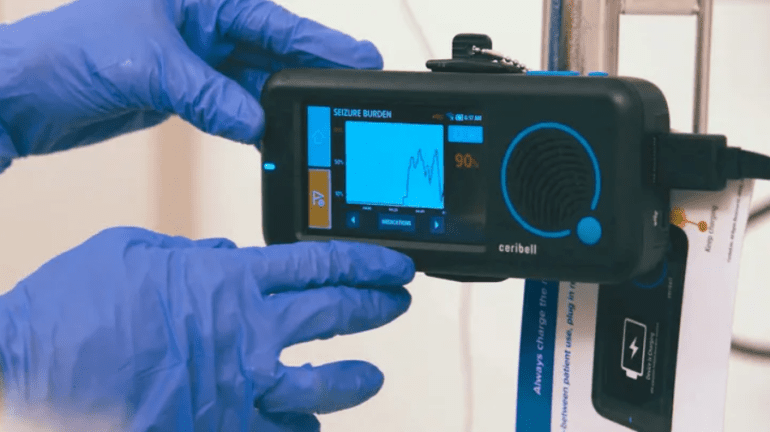TL;DR:
- Northwell Health employs AI to enhance medical diagnostics and patient care.
- Ceribell’s AI-powered headband swiftly detects seizures, revolutionizing treatment.
- Traditional EEG tests take hours, while Ceribell delivers results in just six minutes.
- AI streamlines healthcare operations, optimizes resource allocation, and keeps patients closer to home.
- The device is user-friendly and is set to expand its deployment across Northwell Health.
- AI complements doctors, improving patient care without replacing medical professionals.
- Northwell Health envisions further AI integration, emphasizing accuracy and patient safety.
Main AI News:
In the ever-evolving landscape of healthcare, artificial intelligence is carving out a prominent role, reshaping the way doctors and medical professionals approach patient care. At Northwell Health, New York’s largest healthcare system, physicians are harnessing the power of AI to detect pulmonary embolisms, pancreatic cancers, and more, ushering in a new era of medical diagnostics and treatment.
One remarkable application of AI at Northwell Health is the utilization of an AI-powered headband created by Ceribell to enhance the detection of seizures in patients. Dr. Richard Stumacher, Chief Medical Officer at Northwell’s Northern Westchester Hospital, highlights the significance of this AI device, stating, “This AI device allows us to treat the patient in the moment and changes our ability to provide care.”
Ceribell’s FDA-cleared medical device features a head strap equipped with ten electrodes and advanced AI algorithms that swiftly detect seizure activity in patients. What sets Ceribell apart is its ability to provide instantaneous bedside alerts when abnormal brain wave patterns indicative of seizures are detected. Moreover, it seamlessly connects with a portable electroencephalogram (EEG) recorder and a web portal for real-time tracking, ensuring swift diagnosis and treatment.
Traditional EEG tests often consume hours, ranging from four to sixty, whereas Ceribell accomplishes the same task in a mere six minutes. This efficiency is paramount, particularly in intensive care units where silent seizures, not visible externally, can occur frequently. Dr. Mangala Narasimhan, Director of Critical Care Services at Northwell Health, emphasizes, “Being able to find those patients and treat those patients appropriately quickly is very important.”
A real-life example highlights the device’s effectiveness: a patient with “toxic metabolic encephalopathy” arrived at Northwell’s Northern Westchester Hospital in an altered mental state and unable to wake up. The timely use of the Ceribell device enabled doctors to intervene effectively and observe the patient’s response to medication, averting the need for more invasive measures.
Beyond its life-saving potential, Ceribell’s AI device streamlines healthcare operations. It assists in medication management and offers real-time insights into a patient’s response to treatment, eliminating the need for patient transfers between facilities. This not only enhances patient care but also optimizes resource allocation, benefiting both healthcare professionals and families who can stay closer to home.
One remarkable aspect of Ceribell’s AI device is its ease of use, requiring minimal training for ICU staff to administer. Northwell Health is currently implementing Ceribell in tertiary care centers and plans to extend its deployment to 23 hospitals across its nationwide network, especially those lacking EEG technology.
It’s essential to note that while AI is poised to play a pivotal role in healthcare, it won’t replace doctors. Dr. Stumacher underscores that AI complements medical professionals, allowing them to focus on patient care rather than administrative tasks. This augmentation of medical care proves invaluable, particularly in settings with limited resources and manpower.
Looking ahead, Northwell Health envisions further AI integration in healthcare, including remote patient monitoring, which will free up resources to concentrate on those who need immediate attention. However, the medical community remains vigilant about the accuracy and safety of AI-driven solutions, emphasizing the paramount importance of patient well-being.
As AI continues to advance and evolve, doctors believe that it offers a tremendous opportunity to deliver more efficient and effective patient care, ensuring top-of-the-line healthcare around the clock. Dr. Stumacher sums it up succinctly: “This gives us a really great opportunity not just for driving AI, but to be able to provide top-of-the-line, 24/7 care to patients, whether or not we have the human resources at that moment.“
Conclusion:
The integration of AI in healthcare, exemplified by Northwell Health’s success with Ceribell, signifies a transformative shift in the market. AI-driven devices not only enhance patient care but also optimize resource allocation and streamline operations. The future holds the promise of even greater AI integration, reinforcing the importance of accuracy and patient safety in this evolving landscape.

